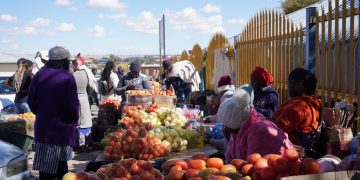
The BRICS pact, comprising of Brazil, Russia, India, China, and South Africa, has long held significant sway in global politics and economics. With the proposal of a new BRICS currency and the intent to reduce dependency on the United States Dollar (USD), major shifts in the financial landscape are anticipated.
Additionally, with the incorporation of six nations such as the UAE, Iran, and Egypt.This article seeks to assess the potential impact on three key areas of topical interest; impact on the USD, Impact on the Rand/JSE and finally the impact on the Namibian economy and Financial Markets.
Impact on the USD
- Diminishing Dominance: The dollar’s global preeminence may be contested as BRICS nations pivot away from the USD in their trade, potentially affecting its hegemonic status.
- Trade Balances and Exchange Rates: A deviation from the USD may lead to exchange rate readjustments. Challenges could arise in financing US trade and budget deficits if the demand for the USD wanes.
- Diversification of Reserve Assets: As BRICS nations hold significant forex reserves, the introduction of a BRICS currency could lead to a diversification of reserve assets where the USD is a key holding. This may influence bond markets, especially if BRICS nations shift away from US Treasuries.
Impact on JSE during USD Weakness and ZAR Strength
- Commodity Boost: As a considerable exporter of commodities, South Africa could witness a surge in the resources segment of the JSE when the USD weakens. This is due to the often-inverse relationship between commodity prices, such as gold and platinum, and the USD.
- Financial Sector Dynamics: A robust ZAR combined with a weakening USD might present mixed implications for the financial sector. Inflationary pressures could be countered with a more accommodative monetary stance, benefiting financial institutions. However, firms with substantial overseas revenues might grapple with currency translation effects. Therefore, SA Inc (locally listed shares who derive earnings in Rand) may fare favorably compared to your Rand hedge shares.
Implications for Namibia’s Economy
- Export Competitiveness: The potential strengthening of the ZAR and NAD could challenge Namibia’s export competitiveness, given its reliance on commodities like diamonds, uranium, and beef.
- Import Costs: A stronger NAD may reduce import costs, aiding in inflation control.
- Tourism: While a strengthened NAD could deter foreign tourists due to increased costs, it might also encourage local tourism.
- Fiscal Policy: The BRICS initiative might provide the Namibian government with enhanced fiscal and monetary flexibility, particularly if USD debt burdens decrease, allowing for more resource allocation to developmental projects.
Implications for Namibian Financial Markets
- Foreign Investment Flows: A stabilized financial market could attract more foreign investments, potentially increasing liquidity on the NSX. However, an appreciating NAD might generate concerns regarding profit repatriation for foreign stakeholders.
- Debt Markets: A stronger NAD and reduced reliance on the USD might position the government to issue bonds at more attractive rates. Conversely, this might translate to lower yields for investors but decreased borrowing expenditures for the government.
- Banking and Financial Services Sector: Financial institutions could experience reduced forex risks, and lending rates might become more favorable for borrowers given rate cut expectations, thereby stimulating economic activities.
- Asset Management: The introduction of a BRICS currency could compel fund managers to reassess portfolio diversifications, leading to potential shifts towards local assets or assets within the BRICS nexus. With potentially lower government bond yields, fund managers might seek alternative instruments to deliver returns, leading to innovation in the financial products offered in Namibia.
Conclusion
The endeavor to introduce a BRICS currency and reduce the USD’s reliance is ambitious. While it promises to reshape global financial markets, offering an alternative to the USD’s dominance, it comes with challenges that need careful navigation. Only time will reveal the actual impact on the global economy, but it’s undeniable that the BRICS pact’s moves are set to make waves in the financial world. For active managers and investors, there is definitely money to be made from the unknown volatility.
*Arinze Okafor CFA, CAIA is a qualified investment professional with expertise in macroeconomics, capital markets, fixed income, equity and investment management. He serves as the Chief Investment Officer of Mopane Asset Management.













